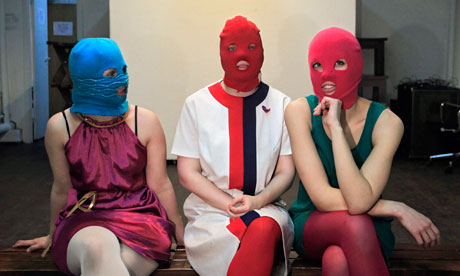By Connie Hong
Impunity Watch Reporter, Europe
MOSCOW, Russia – Two members of Pussy Riot, a Russian feminist punk band, had fled the country in order to avoid prosecution for their involvement in an anti-Putin performance held at the alter of Christ the Savior cathedral. Their decision to leave the country comes after the conviction of three of their band mates for hooliganism motivated by religious hatred. The three women were sentenced to two years of jail time, but their defense lawyers are expected to soon appeal their sentences.
 Members of Pussy Riot wearing colorful balaclavas. (Photo Courtesy of The Guardian) Continue Reading
Members of Pussy Riot wearing colorful balaclavas. (Photo Courtesy of The Guardian) Continue Reading



